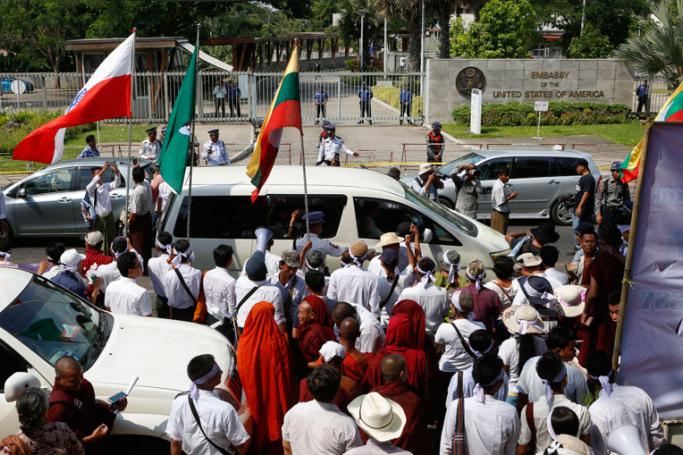Myanmar police said Monday that they have begun legal action against five protesters over a weekend rally intended to promote religious tolerance.
Myanmar police are posted outside the US embassy during a rally by supporters and monks belonging to the hard-line Buddhist group Ma BaTha in Yangon, Myanmar on April 28, 2016
The move came as rights groups raise concerns about efforts by the new pro-democracy government to amend draconian laws on demonstrations.
Dozens of activists and students marched through Yangon on Saturday in a rare gesture of religious solidarity in the diverse nation, where rising Buddhist nationalism has stoked anti-Muslim sentiment and sporadic bouts of bloodshed in recent years.
Police said they decided to take action against five rally leaders -- believed to be three women and two men of several faiths -- because the campaigners had deviated from the agreed protest route.
They now face a charge that could land them in jail for up to six months under a controversial law, currently being reviewed by the new government led by political prisoner-turned-politician Aung San Suu Kyi.
"We have started legal action against five protest leaders under Section 19 of the Peaceful Assembly Act," police Lieutenant Major Win Tin from KyauktadaTownship told AFP.
Suu Kyi's party is stacked with former dissidents who served prison time for their opposition to Myanmar's military governments during decades of repressive rule.
They are now in government following a landslide November election victory.
Since taking the helm the administration has freed scores of activists and political prisoners and signalled its determination to repeal oppressive laws.
But rights groups have raised the alarm over a number of provisions in a draft amendment to the Peaceful Assembly Act. They fear these will continue to penalise non-violent demonstrations, albeit with shorter jail terms.
"You don't need these punishments in your draft. If you remove these three or four things then it's pretty good and you won't be condemning another generation of peaceful protesters for breaking a flawed law," said David Mathieson of Human Rights Watch.
He said the revised law would still give "carte blanche to abusive local officials" to prosecute activists and urged a rethink.
The proposed draft would mean protesters must still give local police 48 hours' notice of the place and time of any rally, as well as details of planned speeches and slogans.
Those who protest without giving prior notice could be imprisoned for three months, while repeat offenders could face a year behind bars.
Parliament is due to debate the law in the coming days.
Rangoon police have also begun legal action against seven leaders of an unauthorised protest by Buddhist nationalists outside the US embassy last month.
They were demonstrating against the US use of the term "Rohingya" to refer to the persecuted Muslim minority in the western state of Rakhine.
Hard-line Buddhists label the group "Bengalis" and view them as illegal immigrants from Bangladesh, even though many can trace their ancestry back generations.
© AFP
You are viewing the old site.
Please update your bookmark to https://eng.mizzima.com.
Mizzima Weekly Magazine Issue...
14 December 2023
Spring Revolution Daily News f...
13 December 2023
New UK Burma sanctions welcome...
13 December 2023
Spring Revolution Daily News f...
12 December 2023
Spring Revolution Daily News f...
11 December 2023
Spring Revolution Daily News f...
08 December 2023
Spring Revolution Daily News f...
07 December 2023
Diaspora journalists increasin...
07 December 2023
Euromoney Myanmar Global Investment Forum begins in Nay Pyi Taw












